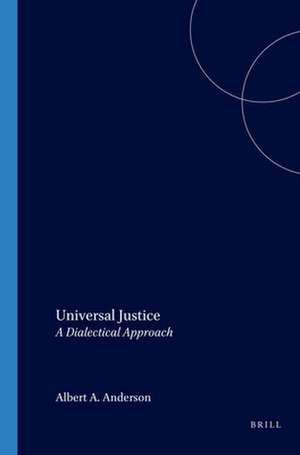Universal Justice: A Dialectical Approach: Value Inquiry Book Series / Universal Justice, cartea 47
Autor Albert A. Andersonen Limba Engleză Paperback – 31 dec 1996
The approach is dialectical in Plato's sense of that term. Dialectic is both necessary and sufficient for the theoretical and the practical aspects of living. The primary symbol in this book is the Athenian Socrates who spent his days in the Agora and his evenings in the houses of his friends, the active professionals of the world's first democracy. His questions were unabashedly philosophical, concerned with the most urgent matters. What is worth living for? What is worth dying for? Who is best suited to rule in the state? How should young people be educated?
The nature of justice is closely connected with other questions of value, so the discussion freely moves from that central focus to related matters with the primary goal of developing a dialectical philosophy that is both applicable to life and open to all.
Universal Justice is concerned with how to think about justice rather than what to think about justice.
Preț: 326.09 lei
Nou
Puncte Express: 489
Preț estimativ în valută:
62.40€ • 65.32$ • 51.63£
62.40€ • 65.32$ • 51.63£
Carte indisponibilă temporar
Doresc să fiu notificat când acest titlu va fi disponibil:
Se trimite...
Preluare comenzi: 021 569.72.76
Specificații
ISBN-13: 9789042002494
ISBN-10: 9042002492
Dimensiuni: 150 x 220 mm
Greutate: 0.35 kg
Editura: Brill
Colecția Brill
Seria Value Inquiry Book Series / Universal Justice
ISBN-10: 9042002492
Dimensiuni: 150 x 220 mm
Greutate: 0.35 kg
Editura: Brill
Colecția Brill
Seria Value Inquiry Book Series / Universal Justice
Cuprins
Editorial Foreword. Acknowledgements. ONE Justice as a Philosophical Problem. TWO Is Universal Philosophy Possible? 1. Metaphilosophy. 2. Dialectic and Humanism. THREE Dialectic and Dialogue. 1. What Plato Did Not Write. 2. What Plato Did Write and Why. FOUR Universal Education. FIVE Universal Justice and the Common Good. 1. Social Science and Its Assumptions. 2. Tradition and the Justification of Values. 3. Dialectic and the Aristotelian Tradition. 4. Justice and the Common Good. SIX Universal Justice in the Modern World. 1. The Power Company, Part I. 2. The Power Company, Part II. 3. The Power Company, Part III. SEVEN Universals. 1. Between Scylla and Charybdis. 2. What Being Is Not. 3. The Power Company, Part III. EIGHT. Universal Love. NINE. Universal Mind. 1. The First Voyage. 2. The Second Voyage. Notes. Bibliography. About the Author. Index.

